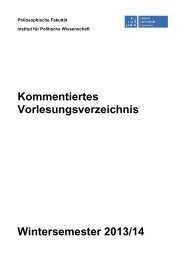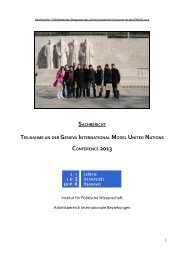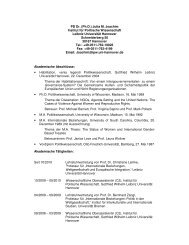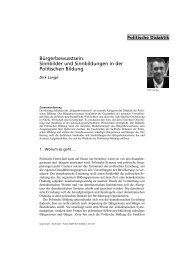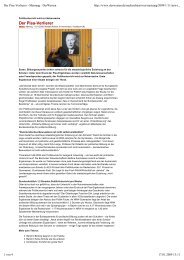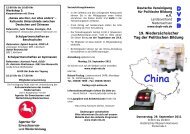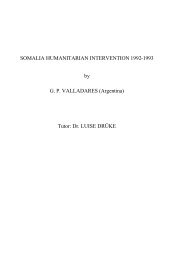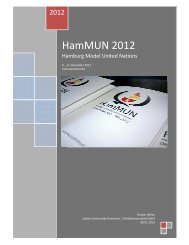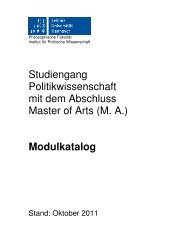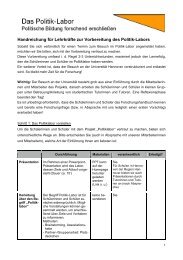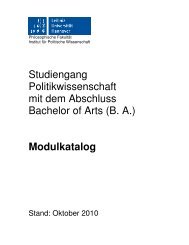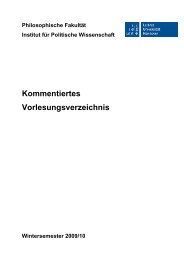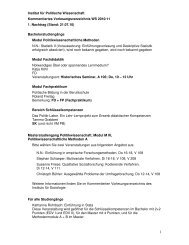Preventive Action for Refugee Producing Situations
Preventive Action for Refugee Producing Situations
Preventive Action for Refugee Producing Situations
You also want an ePaper? Increase the reach of your titles
YUMPU automatically turns print PDFs into web optimized ePapers that Google loves.
208 Chapter 5<br />
<strong>for</strong> improving international cooperation to avert new massive flows of refugees<br />
489<br />
The Group conducted its study between April 1983 and May 1986, and was<br />
able to achieve a consensus among its 25 members on the conclusions and<br />
recommendations in its final report. With the submission of its report to the<br />
Secretary-General, the Group had successfully fulfilled its mandate.<br />
The Special Political Committee (SPC) of the General Assembly reviewed<br />
the report. As a follow-up, 20 states 490 cosponsored and introduced a draft<br />
resolution into the Special Political Committee, 491 which commended the<br />
Group "<strong>for</strong> the work it has accomplished by consensus as reflected in its<br />
report." 492 After the report was presented to the SPC and the draft resolution<br />
introduced, 493 nine more countries joined in co-sponsoring the draft<br />
resolution. 494 Without much further debate, the SPC adopted the resolution by<br />
consensus and recommended its adoption to the General Assembly. 495<br />
On 11 December 1986, the General Assembly considered and adopted the<br />
Group's final report again by consensus. This was virtually the first time a UN<br />
group had worked so persistently on such a sensitive issue and seen it through.<br />
There<strong>for</strong>e the emerged consensus has a particular significance in that it<br />
reflects some political willingness on the part of the states to take the UN<br />
Group's conclusions and recommendations seriously. This willingness, though<br />
still tentative and in need of careful fostering, may be interpreted and invoked<br />
as a legal basis <strong>for</strong> implementing the refugee-prevention responsibilities that<br />
the General Assembly, through the endorsement of the Group's<br />
recommendations assigned to the states, 496<br />
__________________________<br />
489 UN Doc A/41/324,13 May 1986.<br />
490 Australia, Austria, Canada, Costa Rica, Czecholovakia, Denmark, Djibouti,<br />
Federal Republic of Germany, Honduras, Italy, Japan, Norway, Pakistan,<br />
Senegal, Somalia, Sudan, Thailand, Togo, United Kingdom, and the United<br />
States of America.<br />
491 UN doc. A/SPC/41/L.5,9 October 1986.<br />
492 UN doc. A/ SPC/41/L.5,9 October 1986, paragraph 1.<br />
493 UN doc. A/SPC 41/L.5,9 October 1986.<br />
494 Bangladesh, Cameroon, Greece, Indonesia, Ireland, Malaysia, the Philippines,<br />
Singapore, and Swaziland.<br />
495 UN doc A/41/755,23 October 1986.<br />
496 The main obligations that the report imposed on states were: To respect the principles<br />
in the Charter, to use peaceful means <strong>for</strong> resolving international disputes,<br />
and thus improve situations that suggest a danger of future flows of refugees; to<br />
prevent new massive flows of refugees, to promote civil, political, economic, so-<br />
Legal Justification 209<br />
the main organs, 497 the Secretary-General, 49 « and other competent UN<br />
bodies. 499<br />
Moreover, this emerging consensus on the legitimacy of taking action in<br />
the country of origin, so that people would not have to flee, opens the way<br />
<strong>for</strong> new initiatives that could be tied in with programs of the UN bodies, as<br />
mandated by the General Assembly. There<strong>for</strong>e, our policy propositions<br />
should not face objection from member states.<br />
5.3.2. The erosion of domestic jurisdiction over human rights violations<br />
Massive violations of human rights and fundamental freedoms are a major<br />
cause of refugee flows. This section will briefly examine how the extension<br />
of international and regional human rights law is contributing to a erosion of<br />
domestic jurisdiction in this field.<br />
Progress in the codification of international human rights instruments,<br />
and strengthened practical application, are paving the way <strong>for</strong> international<br />
preventive action in this field. The modern history of international human<br />
rights codification may be grouped into the four following periods 500<br />
cial and cultural rights, to cooperate with one another in order to prevent future<br />
massive flows of refugees, and wherever new massive refugee flows occur, to<br />
respect existing generally recognized norms and principles. See UN doc.<br />
A/41/324,13 May 1986.<br />
497 To make fuller use of their respective competencies under the Charter <strong>for</strong> the<br />
prevention of new massive flows of refugee flows. See UN doc A/41/324, 13<br />
May 1986, p. 17.<br />
498 The consensus also provides the Secretary-General with the legal basis to give<br />
continuing attention to the question of averting mew massive flows of<br />
refugees, to ensure that timely and fuller in<strong>for</strong>mation relevant to the matter is<br />
available in the Secretariat, to improve the co-ordination within the Secretariat<br />
<strong>for</strong> obtaining early assessments on situations that might give rise to new<br />
massive flows of refugees; and to help improve the co-ordination of the ef<strong>for</strong>ts<br />
of the United Nations organs and specialized agencies and of member states<br />
concerned <strong>for</strong> timely and more effective action. See UN doc. A/41/324,13 May<br />
1986, p. 18.<br />
499 In the selection of projects, they should consider, in consultation with the<br />
states directly concerned, giving greater support to those projects that directly<br />
or indirectly could help avert new massive refugee flows. UN doc. A/ 41/324,<br />
13 May 1986, p. 18.<br />
500 This section draws from the lecture given by Bertram Ramcharam,<br />
"Reflections on the Protection of Human Rights in the UN", at the Harvard<br />
Law School/ Human Rights Program, 17 September 1988.



